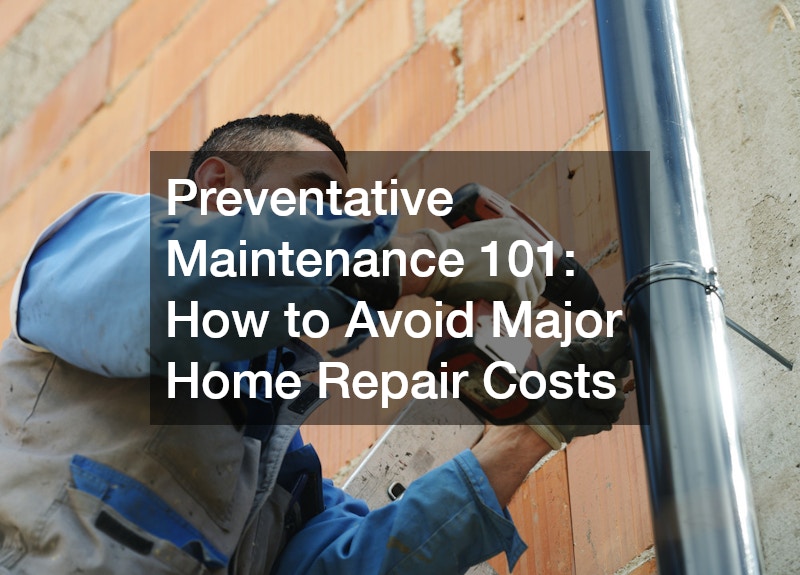Few things drain a homeowner’s budget faster than unexpected repairs. Whether it’s a leaking roof, a broken pipe, or a malfunctioning system, major fixes can appear out of nowhere—and they’re almost always more expensive than we expect. The key to avoiding these emergencies lies in one powerful principle: preventative maintenance.
Preventative maintenance is about being proactive instead of reactive. It’s the consistent care that keeps your home’s systems, structures, and surfaces functioning efficiently year after year. By investing a little time and attention now, homeowners can prevent the kind of costly surprises that lead to frustration and financial strain later.
This guide explores a comprehensive approach to home maintenance. We’ll break down how to protect every part of your property—from the systems that control temperature and water flow to the structural elements that keep your home safe and sound. You’ll find practical advice, expert-level insights, and clear steps for creating your own home care plan that actually works.
Keep Your Climate Systems Running Efficiently

Your home’s heating, cooling, and water systems are essential to comfort and livability—but they’re also some of the most expensive to repair or replace. Regular maintenance helps these systems operate at peak efficiency and prevents breakdowns that can cost thousands.
1. Why Preventative HVAC Care Matters
Your HVAC system runs nearly year-round, managing temperature, air circulation, and indoor air quality. Even minor neglect—like forgetting to replace filters or ignoring strange noises—can lead to mechanical failure.
To stay ahead:
-
Schedule professional inspections twice a year with a trusted ac company.
-
Replace filters every 1–3 months, depending on usage and indoor air quality.
-
Clear debris from exterior condenser units and keep at least two feet of space around them.
-
Inspect for duct leaks or insulation gaps that cause energy waste.
A reputable technician can identify worn belts, low refrigerant levels, and airflow issues long before they cause a system breakdown.
2. Don’t Forget the Plumbing
Your plumbing network is another area where small issues quickly become major repairs. A reliable plumbing company can help detect early warning signs of leaks, corrosion, and pressure irregularities.
Homeowners should:
-
Check under sinks and around appliances monthly for moisture or discoloration.
-
Flush water heaters annually to remove sediment buildup.
-
Know where the main water shut-off valve is located.
-
Insulate exposed pipes to prevent freezing in winter.
Routine inspections protect your home from one of the most common (and expensive) household disasters: water damage.
Protect Your Home’s Water Supply and Irrigation System
Many homeowners focus on indoor maintenance but overlook outdoor systems that are just as vital. Irrigation and well systems sustain lawns, gardens, and water access—but leaks and malfunctions can waste water and inflate utility bills.
1. Maintaining an Efficient Sprinkler System
An irrigation system that’s off by even a small margin can waste hundreds of gallons of water per week.
To maintain performance:
-
Inspect sprinkler heads before every watering season.
-
Adjust spray direction to avoid hitting driveways or sidewalks.
-
Schedule professional lawn sprinkler repair if you notice uneven watering or weak pressure.
-
Test your timer system to ensure it follows local watering regulations.
Efficient watering not only conserves water but also keeps your landscaping healthy and prevents soil erosion.
2. Keeping Your Well System Reliable
If your home relies on well water, the health of your pump determines your water quality and consistency. A professional well pump repair service should perform annual inspections that include:
-
Checking for low water pressure or sputtering faucets.
-
Testing for electrical component wear.
-
Inspecting water for sediment or discoloration.
-
Ensuring the pump is not short-cycling (turning on and off too frequently).
Consistent well maintenance guarantees a dependable water source while protecting expensive pump components from premature failure.
Safeguard the Structure Above You

Your roof silently endures weather, debris, and temperature extremes year after year. When left unchecked, small issues like loose shingles or clogged gutters can turn into leaks, insulation problems, or structural rot.
1. Inspect and Repair Before It’s Too Late
Experts recommend having your roof inspected at least twice a year by a reputable roofing contractor. A trained eye can spot potential trouble areas you might miss, including:
-
Missing or curling shingles.
-
Sagging areas or ponding water.
-
Flashing deterioration around vents or chimneys.
-
Hidden leaks that cause unseen ceiling damage.
Regular inspections can extend your roof’s life by years and save you from emergency replacements.
2. The Importance of Regular Cleaning
Even the strongest roofing materials can’t withstand the long-term effects of moss, algae, or accumulated debris. Routine roof cleaning helps preserve both the integrity and the curb appeal of your home.
To do it safely:
-
Remove debris like branches and leaves after storms.
-
Use gentle, non-pressure cleaning methods to prevent shingle damage.
-
Keep gutters clear to ensure proper drainage.
Clean, well-maintained roofs not only look better—they also reflect sunlight more effectively, improving energy efficiency.
Maintain What’s Underfoot — Driveways and Pavement
Driveways and walkways often go unnoticed until cracks and potholes start appearing. Yet, like any structural feature, they benefit from regular care and sealing.
1. Understanding the Causes of Damage
Your driveway endures constant stress from vehicles, temperature swings, and moisture. These factors cause the surface to expand and contract, forming cracks over time. Without treatment, water seeps in, freezes, and widens the damage.
2. Preventative Measures for Longevity
-
Seal small cracks immediately to keep moisture out.
-
Apply a fresh coat of asphalt sealer every 2–3 years to restore a protective barrier.
-
Ensure proper drainage so water doesn’t pool or erode edges.
-
Hire a professional asphalt paving service when resurfacing or repaving is necessary.
Proper maintenance not only preserves the look of your property but also prevents structural degradation that can affect your home’s foundation and safety.
Don’t Overlook What’s Underground
Some of the most expensive and disruptive home repairs occur beneath the surface. Septic systems and underground plumbing lines are out of sight—but never out of mind for responsible homeowners.
1. The Hidden Cost of Neglect
When septic systems fail, the cleanup and replacement can cost tens of thousands of dollars. Preventative care is straightforward and far less costly:
-
Schedule pumping every 3–5 years, depending on household size.
-
Avoid flushing wipes, grease, or chemicals that harm beneficial bacteria.
-
Monitor the drain field for pooling water or foul odors.
Timely maintenance prevents the need for expensive septic repairs and protects your property and groundwater.
2. Keep an Eye on Your Plumbing Infrastructure
Underground plumbing lines can corrode or become clogged by tree roots. Partnering with a plumbing company that offers camera inspections helps detect early warning signs.
Look for:
-
Slow drains across multiple fixtures.
-
Gurgling noises in pipes.
-
Sudden spikes in your water bill.
By addressing these signs early, homeowners can avoid catastrophic leaks that damage foundations and flooring.
Secure Access and Safety Features

Home safety isn’t only about locks and alarms—it also involves maintaining key entry points and structural reinforcements. Garage doors, for example, play a vital role in home security, energy efficiency, and convenience.
1. Garage Door Maintenance for Safety and Reliability
A garage door that jams, squeaks, or won’t close properly is more than an annoyance—it’s a potential hazard. Schedule an annual tune-up with a qualified garage door contractor who will:
-
Lubricate springs, rollers, and hinges.
-
Adjust tension and balance.
-
Test safety sensors and auto-reverse functions.
-
Inspect weather stripping to prevent drafts.
Routine service ensures safe operation and extends the life of the motor and panels.
2. Protecting Structural Openings
Attached garages and entryways share the same vulnerabilities as the rest of your home’s roofline. Partnering with a roofing contractor ensures these transitions are properly sealed.
-
Check flashing and sealant where the roof meets the garage.
-
Ensure consistent insulation to prevent temperature transfer.
Attention to these details prevents moisture intrusion, energy loss, and structural damage.
Create a Long-Term Maintenance Plan
Preventative maintenance is most effective when it’s planned, scheduled, and documented. A long-term plan ensures no system goes overlooked.
1. Building Your Home Maintenance Calendar
Start by dividing your home’s maintenance needs by season:
-
Spring: Inspect irrigation systems and schedule lawn sprinkler repair if needed. Clean gutters and check for roof damage after winter storms.
-
Summer: Have your ac company perform a mid-season inspection to maintain optimal cooling performance. Power wash exterior surfaces.
-
Fall: Prepare for colder months—inspect heating systems, seal windows, and apply driveway sealant.
-
Winter: Monitor insulation and check plumbing for signs of freezing.
Using a digital calendar or reminder app helps track when each system was last serviced.
2. Budgeting for Maintenance
Preventative care isn’t just about time—it’s about budgeting wisely. Set aside a small percentage of your home’s value annually (typically 1–3%) for routine maintenance. This ensures funds are available for inspections, small repairs, or seasonal upkeep without financial strain.
A written plan gives peace of mind and protects your investment over the long term.
When to Hire and When to DIY

Many homeowners love tackling small projects themselves—but knowing your limits is essential to preventing accidents or further damage.
1. Safe and Simple DIY Tasks
These are ideal for homeowners with basic tools and knowledge:
-
Cleaning gutters and downspouts.
-
Resealing driveway cracks.
-
Replacing air filters and smoke detector batteries.
-
Tightening door hardware or applying weather stripping.
These quick tasks can significantly improve efficiency and appearance without professional help.
2. When to Call the Experts
Certain systems, however, require professional expertise due to electrical, mechanical, or safety complexity:
-
Well pump repair service should always be performed by licensed technicians to avoid contamination or pressure issues.
-
Garage door contractor services are crucial for spring tension adjustments or motor repairs—both of which can be dangerous to DIY.
Hiring professionals ensures that work is up to code, warranties remain valid, and safety risks are minimized.
3. Vetting Reliable Professionals
When choosing contractors:
-
Ask for licenses and insurance verification.
-
Read reviews and check local references.
-
Request detailed quotes and maintenance recommendations.
-
Prioritize transparent communication and long-term relationships over one-time transactions.
Establishing a network of trustworthy service providers helps keep your home running smoothly for years.
Owning a home comes with immense pride—but also with responsibility. The secret to avoiding major repair costs isn’t luck; it’s a proactive mindset built on consistent care and attention. By taking time to inspect, clean, and service your home’s systems throughout the year, you prevent emergencies before they start.
Preventative maintenance isn’t glamorous, but it’s the foundation of a safe, efficient, and valuable property. A well-maintained home lasts longer, performs better, and costs less to own over time.
Now is the perfect time to walk through your home, create your maintenance plan, and schedule those overdue inspections. A little effort today can save you thousands tomorrow—and give you lasting confidence that your home is in the best possible shape.



